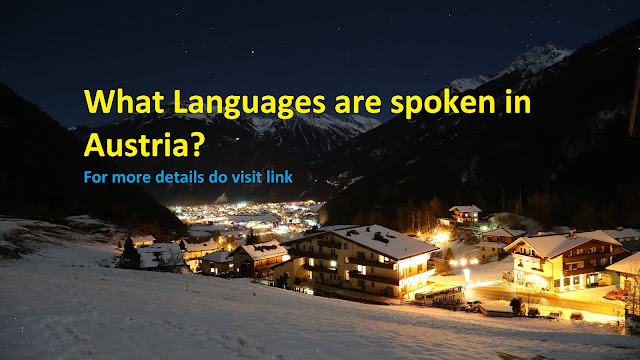What Languages are Spoken in Austria?
There is no language in the world called Austrian, so what do Austrians speak in Austria? Austrian German is the official language of the country, which differs from German language as it is spoken by Germans and is influenced by the Austro-Bavarian dialect. But as you’ll see and will find from our overview of the languages that are spoken in Austria, it has many more spoken languages and dialects.
Austria Official language
German is the official language in the country of Austria. As a lingua franca, it is the Austrian resident’s first language and approximately all Austrians learn it in their schools, collage and universities and speak it. About 97 to 98 percent of people in Austria speak German language while a little over 93 percent call it their mother tongue. Official publications and announcements in the country as well as the media, news and public schools use it. Austrian German language is in large part influenced by the dialect Austro-Bavarian.
Other official languages spoken in
Austria
Additionally to
the German language, individual Austrian regions recognize languages of various
autonomous ethnic groups as official languages. These legally protected
linguistic minorities in Austria include the Burgenland Hungary and Burgenland
Croats, the Corinthian Slovenes, as well as Czechs, Slovaks and Roma.
Austria seeks to protect its cultural and linguistic diversity. In some regions, ethnic groups are entitled to indigenous language schooling and official communication with the authorities, for instance in Burgenland Croatian, Romani (the Roma language), Slovenian, Slovak, Czech and Hungarian.
History of Austria’s languages
Austria’s
borders were subject to a variety of changes throughout history, as you may
well know it. Almost a century ago, Austria Country was part of the
multi-ethnic Austro-Hungarian Empire. Its many languages such as Czech,
Hungarian, Slovak, Croatian and Slovenian, are still spoken partly in the
country of Austria today.
Immigration more
diversified the languages spoken in the country today. Guest workers in the
1960s and 1970s came in the country from Yugoslavia and Turkey and brought
their languages and culture with them, more enriching the existing mix. Till
today, Austrian German language still includes number of words and idioms borrowed
and adopted from Hungarian, Czech, Italian, South Slavic or Yiddish.
Other languages Spoken in Austria
Just above 40
percent of Austrian residents speaks English language, which is less or more on
par with the average in European countries.
Therefore, English is the second most spoken language in the country,
followed by French, which approximately 7 percent of Austrians speak. Less than
1 percent of country’s population calls English as their mother tongue.
The percentages
for other languages spoken in the country of Austria are given below:
Italian
language: 5.5 percent.
Spanish
language: 2.5 percent.
Croatian
language: 2.25 percent.
Turkish
language: 1.75 percent.
Russian
language: 1.3 percent.
Hungarian
language: 1.13 percent.
Slovenian
language: 1.07 percent.
Polish language:
0.7 percent.
Slovak language:
0.66 percent.
Other minority languages in Austria
There are also minority
languages in the country of Austria which are not protected by the European
Charter for minority or regional languages, such as “Windisch” and “Jenisch”,
which is the German word for a number of Slavic languages. The Austrian regions
of Styria and Carinthia use “Windisch” to describe local Slovenian dialects
interspersed with numerous German words.
A big number of
Turkish speakers and immigrants from former Yugoslavia don’t have their
languages recognized as protected minority languages, so these languages are
not taught in the school. Extremely rare languages used in the county of
Austria include Aramaic, which is spoken by the Christian Assyrian diaspora
community in Vienna.
Dialects in Austria
Austrian German
exists as a spoken and written high language, a standard variety of the German
language. Therefore, it is different in both vocabulary and grammar from German
as written and spoken in Switzerland and Germany.
Country’s
dialects follow a dialect continuum, meaning the state’s borders don’t
represent a natural language border, but the German dialects spoken in Austria
share characteristics with dialects occurring in the German states of Baden-Württemberg
and Bavaria as well as in the Eastern Switzerland.
With the
exception of Vorarlberg, all Austrian states speak the Bavarian
dialect or a variant thereof. 7 million Austrians
speak a central or southern Bavarian dialect or a colloquial language
influenced by these dialects. In Eastern areas of Austria, you can hear a
smooth transition between standard language and dialect, meaning even in
official situations, you’ll hear the dialect being spoken. In Vorarlberg and Tyrol,
you can encounter Alemannic dialects, but not in the rest of the country.
In addition to
local dialects, the individual federal states have regional dialects, which are
influenced by how the people in the state capital speak. The most prominent
dialect of these is the Viennese dialect, which influences number of other
dialects so they become a mixture of central and southern Bavarian with
Viennese and the high language features.
Do you want to
learn more about the linguistic differences between Austria, Switzerland and
Germany? If yes then let us know in comments and for future information about
World Cultures keep visiting our website thanks.






Post a Comment